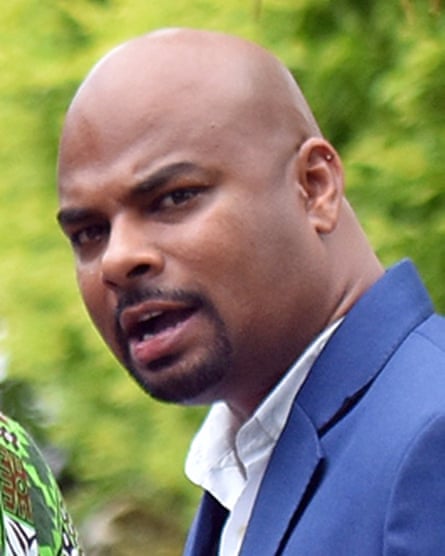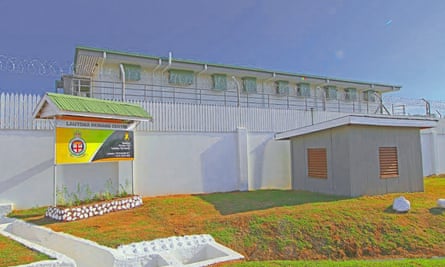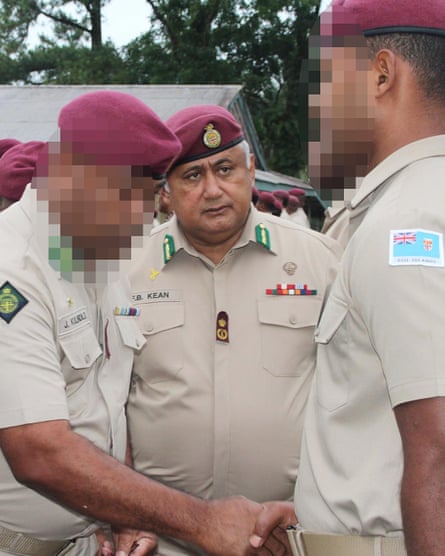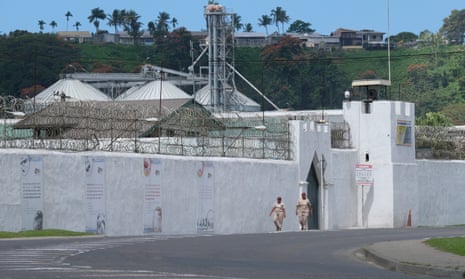Complaints against police and prison officers – including of a violent assault against a young inmate – have been blocked from being investigated by authorities, whistleblowers inside Fiji’s human rights watchdog have claimed, expressing concern the body is not independent of government influence.
Current and former employees of the Fiji Human Rights and Anti-Discrimination Commission have alleged investigators are regularly refused access to victims of alleged assaults by Fijian authorities, and that some rights violations by police or corrections officers are disregarded or not investigated properly.
“In my time with the commission, I sent more than 70 letters to different institutions and around 55 of them were to the corrections and police,” one whistleblower told The Guardian. “From police, we often did not receive any response at all. From the corrections service, responses were always denial.”
A second whistleblower inside the organisation alleged investigations had been stymied by senior officials.
“Issues go up to [the director], but they end up nowhere.”
The director of the human rights commission, Ashwin Raj, has denied the allegations, telling the Guardian all complaints were investigated “in an independent and impartial manner”. He said the commission worked “to transform the human rights culture of Fiji” including building greater access to justice for prisoners and those who complain of police abuse of power.

Allegations of violence and misconduct
The commission’s own publicly available figures show allegations of police brutality and corrections officer violence are the two largest sources of complaints made to the commission.
Statistics from the three most recently available annual reports show widespread allegations of human rights abuses within police and corrections services.
In 2016, of 131 complaints deemed ‘within jurisdiction’ for the commission, 49 were against the police and corrections services.
Half were allegations of brutality, including an assault so severe it left a person in hospital, and half were for “professional misconduct” including wrongful detention, perverting the course of justice, and coercion of people to sign police statements against their will.
In 2017, of 213 within jurisdiction complaints, 63 were against police and corrections officers for acts of violence and professional misconduct, including assaulting minors with disabilities, strip-searching children, and alleged theft.
And in 2018, of 154 complaints, 54 were against police and corrections, including the case of a man who died after allegedly being assaulted by police outside a nightclub.
The annual reports do not detail the result of commission investigations, and the 2019 report has not been made public.
A former employee of the Fiji Human Rights and Anti-Discrimination Commission - the Guardian has agreed to keep his identity anonymous - alleged he witnessed complaints received by the commission “pushed under the rug”, and was told that unfavourable findings against state institutions, like the police or prisons, could jeopardise the director’s position.
“They are not supposed to cover up things when there are rights violations happening. We are supposed to be serving the people and not give lollies to the government.”

The employee claimed the FHRADC received “hundreds of complaints” but were under-resourced with only one investigations officer to attend to all the cases which “were mostly against detention facilities”.
He told the Guardian he was concerned the commission may be “pushing things under the rug, because there was a lot of criticism about the situation in Fiji ... especially the things that are going on in the detention facilities”.
A second commission whistleblower backed up the claims of under-resourcing, saying “the commission’s engine-room, the complaints section, is so under-staffed, there are only two people, who are expected to look after a population of nearly a million people in the country”.
Occasional high-profile cases do bring the issue of state violence to public attention.
Five police officers have been charged over an assault in April, when a man was seriously injured when he was thrown off a bridge.
Two prison officers were charged with murder in April and another two charged with assault after the death of a man in a prison in Lautoka.
But the former commission employee, and international human rights groups, claim these cases, brought to the commission’s attention by public and media exposure, are too often the exception, rather than the rule.
‘More powerful than anybody’
The whistleblower also alleged that the commissioner of the Fiji corrections service Francis Kean, had refused to allow FHRADC staff to investigate cases reported to them by the relatives of the inmates.
“When we were supposed to go see a prisoner, even when there was a court order, no-one really gave it any importance,” he said.
“The head of the corrections service would say ‘our own team will investigate’ or ‘we do not allow you’. He was very relaxed because he thought that he was more powerful than anybody and he was not going to be held responsible for anything.”
The whistleblower said that in 2019, the commission received a complaint from the mother of a young prisoner whose vision was seriously impaired when he was allegedly punched by a prison officer.
“It was really a serious allegation. Then, the mother was not even allowed to see him for six weeks.
“So, the mother comes to the commission to lodge a complaint for the case to be investigated. We sent a letter to the corrections service requesting access to the inmate to investigate the case. The corrections commissioner responded that ‘we’re going to investigate it on our own’.”
The allegation was dismissed by an internal investigation.
“But they never allowed the commission to investigate.”

Kean, the brother-in-law of prime minister Frank Bainimarama was at the centre of a Guardian investigation into prisons brutality in May, when four former prisons officers – two of them his close aides – alleged he routinely ordered staff to assault inmates. The men, who have since sought asylum in Australia, described his leadership style as a “dictatorship”.
Kean was convicted of manslaughter in 2007 over a fight at a wedding in which a man died. He served only a few months of his 18-month sentence in prison.
A spokesman for Kean denied the allegations, labelling them “misinformation” against the “good work” of the corrections service under his leadership, citing rehabilitation, education, and employment programs instituted by the commander.
Raj denied all allegations of political bias or any cover-up in the commission’s work, saying complaints were appropriately investigated “in an independent and impartial manner”.
He told the Guardian that “the prisons and police leadership have demonstrated a willingness to work with the human rights commission to improve systematic barriers to greater human rights respect in their institutions”.
Raj said the commission role was “not only to hold the state to account but to also constructively engage with the state to strengthen human rights safeguards.
“This must not be misconstrued as ‘complicity’. This means that a national human rights institution must prefer dialogue with the state over confrontation, and mediated outcomes over adversarial exchanges while holding them to account for alleged human rights violations.”
International human rights agencies, including Amnesty and the Human Rights Watch Australia, have routinely raised concerns about human rights abuses by state agencies in Fiji.
Kate Schuetze, Amnesty International’s Pacific researcher, alleged that Fiji’s corrections service had “blocked any scrutiny of what is happening in the prisons”.
“What that means is independent agencies like… UN agencies are not getting access to the prisons. It does not surprise me to hear that the Fiji human rights commission is also not getting access.”
Schuetze said Fiji’s legal framework lacked “an independent institution that sits above the hierarchy of the police, in the prison system or even outside the military, to review complaints of mistreatment at the hands of those agencies”.
Elaine Pearson, the director of Human Rights Watch in Australia said “the allegations are deeply disturbing and warrant a full and thorough independent investigation.”
“People should be able to report human rights violations safely, and know there will be a transparent fair process to hold perpetrators to account. It doesn’t sound like that is happening at all,” Pearson said.
Thalia Kehoe Rowden, spokeswoman for Human Rights Measurement Initiative, said Fiji scored poorly by global and regional standards. “Fiji performs poorly on the right to freedom from torture and ill-treatment.”
